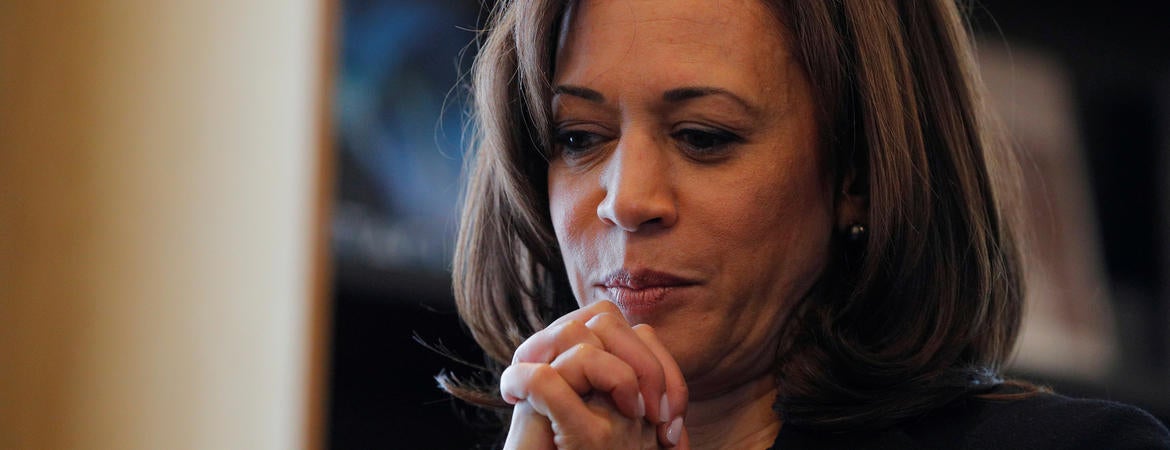
Universally, UC Riverside faculty members noted the historic significance of U.S. Sen. Kamala Harris as Joe Biden’s vice-presidential running mate. Many felt the decision was the right one — and some offered qualifiers in their assessment of her selection.
In the moments following Biden’s announcement on Aug. 11, UCR political scientist and frequent network broadcast commentator Karthick Ramakrishnan tweeted: “This is a historic moment in so many ways — the first Black woman as a major party VP nominee, and the highest-ever nomination for a South Asian and Asian American more generally.” UCR professor and bestselling author Reza Aslan posted a lone, succinct word: “Smart."
Reaction among faculty canvassed for this article demonstrated that Biden’s choice may energize the Democratic base — and in the least shouldn’t alienate many of the party faithful. Some scrutinized Harris’s background as a San Francisco district attorney and former state attorney general. Others said the research shows vice-presidential picks don’t matter much to voters anyway.
The following is a rundown of their varied and thoughtful assessments:
On whether Sen. Harris was the best choice among the field of vice-presidential candidates
Kamala Harris, the Black daughter of Indian and Jamaican immigrants, is the living embodiment of everything that Donald Trump fears about America and which he has railed against in his racist tirades. Her presence on the ticket gives voters the clearest choice yet in this election — a choice between Trump and America.
— Reza Aslan
Professor, Department of Creative Writing and scholar of religions
Harris is a very reassuring choice for moderate Republicans and independents who voted for Trump in 2016 but were contemplating a vote for Biden in this election. At the same time, the most progressive sectors of the Democratic party will be energized to vote Trump out of office and will be happy to vote for a woman of color as vice president. So it's a win-win for the Biden campaign.
— Miguel Carreras
Associate professor, Department of Political Science
I know that many people believe Kamala Harris is an exciting candidate. She is an African American woman, an Indian American, an HBCU grad, and the first candidate from California. However, I hope the excitement about her candidacy does not overshadow her record.
— Natasha McPherson
Assistant professor, Department of History
I was hoping that Biden would choose someone more progressive as his VP, but I think that Kamala Harris was a very safe choice. She's slightly left of him, but not too far left that might detract from undecided moderate voters.
— Jennifer Najera
Associate professor and chair, Department of Ethnic Studies
On whether Sen. Harris will help Biden win the presidency
Yes. Black women are the core of the Democratic party, and this will get them excited about this election. One challenge (Hillary) Clinton faced in 2016 was slight declines in African American turnout. Reversing some of those losses will go a long way toward allowing Democrats to retake key states like Michigan and even Wisconsin, and put Florida back in play.
— Ben Bishin
Professor, Department of Political Science
It’s not clear just how much impact Veep candidates have. Veeps don’t always carry their home state, for example. Though weak VP candidates can maybe lose support from voters who are wavering — there just aren’t many of those voters these days. But Harris is someone who can appeal to suburban voters that the Dems need to win over and can help solidify support among African Americans and, also, the South Asian community.
— Shaun Bowler
Dean, Graduate Division and political scientist
Research suggests that Harris's selection will not have much effect on Biden's chances of victory. Even though vice-presidential picks are often made for strategic reasons, for example, whether that person will help carry a given state, or help with a particular demographic, systematic academic studies find little evidence that vice-presidential picks affect electoral outcomes.
That being said, there is a possibility that Harris' pick might help at the margins in some competitive states. Research by Danielle Lemi, a UCR alum, suggests that a multiracial candidate like Harris will have broad appeal across many groups, because of her overlapping memberships. At the same time, she may not generate as much enthusiasm within each group, especially among those with strong group attachments.
— Jennifer Merolla
Professor, Department of Political Science
Kamala Harris's nomination will certainly boost Biden’s chances of victory with women voters and African American voters, as well as moderate Democrats. Some progressives have taken issue with Biden for his track record on women’s issues, given his handling of the Anita Hill case, and Harris will help him in that regard. However, she won’t help boost support among progressives who are concerned with Biden's track record on criminal justice.
— Jade Sasser
Associate professor, Department of Gender & Sexuality Studies
On Harris’s criminal justice track record
She has a troubling record as a prosecutor, including advocating for transphobic policies in prisons and prosecuting parents of truant school children. In this political moment when Americans all over the country are questioning the efficacy of prisons and the function of the police, I expect that young voters, in particular, will challenge Kamala Harris on her prosecutorial record and her policies regarding incarceration.
— Natasha McPherson
Sen. Harris will face criticism for her prosecutorial background in California, but she has moved to the left on criminal justice issues. Her background as a skilled and effective prosecutor was widely recognized during the Brett Kavanaugh hearings. During the primary, she honed her message in "prosecuting" the case against Trump.
— Jennifer Merolla
Her history as a prosecutor will detract people who are concerned about how the criminal justice system has disproportionately affected communities of color.
— Jennifer Najera
As attorney general in California, she often chose not to investigate police shootings and aligned herself with law enforcement. However, I think she can be pushed to the left. More recently, she has sponsored legislation banning police chokeholds, racial profiling, and no-knock warrants. Let’s keep pushing her toward more progressive policies.
— Jade Sasser
On the importance of selecting a woman of color as Biden’s running mate
We are seeing Black Lives Matter protests across the nation, and widespread calls from all over the country demanding an end to the systemic racism that permeates our society. Women of color are tremendously underrepresented at every level of government in America. Their voices need to be heard at the table in order to truly move us forward as a nation.
Kamala Harris will make history as the first woman of color, the first multiracial woman, the first South Asian woman, and the first Black woman selected as the vice presidential running mate by a major political party. This is something to truly celebrate in this moment, and I hope it inspires us to work quickly to close the gap of underrepresentation of women of color and marginalized groups in the political arena.
— Denise Davis
Director, Women’s Resource Center; Mayor Pro Tem, City of Redlands
Given the salience of racial issues following the protests over the killing of George Floyd, it was important for Biden to choose someone with high credibility on issues of race, and research finds that women of color are generally perceived as more competent than other candidates on handling issues related to race.
The selection of a Black woman is symbolically important in recognizing that Black women are the group most deeply committed to the Democratic party. Furthermore, as research by Karthick Ramakrishnan and others has demonstrated, Asians have been increasingly moving to the Democratic party, so this might further solidify that movement. Finally, as a child of immigrants, Harris also helps to provide a counternarrative on immigration.
— Jennifer Merolla
There was a moment with Biden at one of the presidential debates when she called him out about his record on busing to integrate schools, noting that — as a Black child — she was directly affected by such policies. This is where her identity as someone who intimately understands race in this country will help to provide balance to those who feel like Biden is not racially astute enough to deal with the racial issues that the country is currently reckoning with.
— Jennifer Najera
We need more leaders of color, particularly women of color, in powerful roles like the vice president to advocate for the kinds of changes we need. As we position more diverse candidates in these roles, we chip away at the enduring power structures that have propped white men up for so long. That chipping away is necessary, and this is one more powerful step in that direction.
— Jade Sasser
On how Republicans are likely to assail Harris
If Republicans cannot credibly attack Harris on her record, they will probably try to engage in personal attacks. A lot of academic research, including some of my own research, has shown that female executive leaders are evaluated more harshly than male leaders. In particular, they are often attacked for not being “nice enough” when they show ambition and are assertive.
Traits that are seen positively among male political leaders (toughness, assertiveness, decisiveness) can be perceived negatively among female leaders because they violate deeply held notions of acceptable female behavior. It is therefore not surprising that one of the first lines of attack of President Trump was to describe Harris as “nasty.”
— Miguel Carreras



